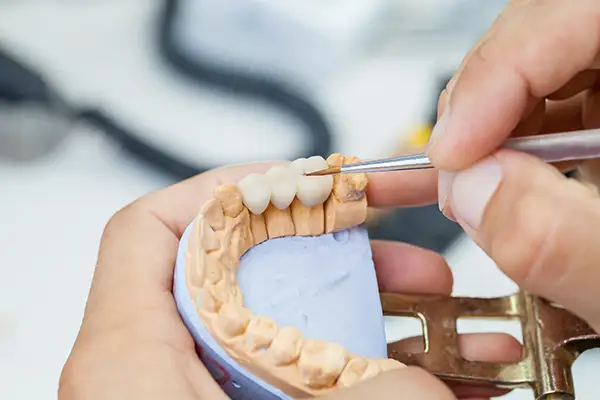 Do you need to replace one or more adjacent teeth due to decay or damage? If you are ready for a more complete smile, our team can help you achieve this. We know that having missing teeth can hinder your confidence and comfort in social interactions and we want to restore it.
Do you need to replace one or more adjacent teeth due to decay or damage? If you are ready for a more complete smile, our team can help you achieve this. We know that having missing teeth can hinder your confidence and comfort in social interactions and we want to restore it.A dental bridge may be a great restoration option for you if you need to replace one or more teeth. Our professionals at Osborne Dentistry offer dental bridges as an intermediate restoration option for patients who have lost teeth or need to have several teeth extracted. This simple and painless restoration can give you back your smile much faster than some other treatment options.
When Are Bridges Used?
A dental bridge is used to "bridge" the gap in your teeth. These bridges consist of a replacement tooth that has a crown on each side of it. A bridge can be made up of just one false tooth, or several depending on your needs and the number of teeth that need to be replaced.
Other restorations, like dental implants, last longer than dental bridges but they require a surgical procedure. Dental bridges are an alternative restoration that is offered to patients who do not need an entirely new smile and may not be up for a surgical procedure. Dental bridges are also a quicker procedure and do not require a long recovery process.
Are There Different Types of Bridges?
There are many variations of dental bridges, but three main types are most common. The first type is typically referred to as a traditional dental bridge and consists of two crowns with one or more pontic teeth in between. This style of the bridge requires that our professional modify the two teeth that are adjacent to your empty space so that the crowns of the bridge can be cemented in place. Since it is held in place by crowns, it provides good bite strength and a secure fit.
However, there are not always teeth located on either side of a gap. When this is the case, a cantilever bridge can be used. This style of bridge is similar to regular bridges but only includes a crown on one side of the prosthetic teeth. These are generally used when replacing teeth towards the back of your mouth.
The third type of bridge is installed without any crowns at all. Instead, it uses metal frames that are attached to the back of teeth that are adjacent to the empty space. This style of bridge is not as strong as regular bridges, but they do not require that your teeth be modified for the placement of crowns.
Do Bridges Last?
Bridges are relatively durable but do not last as long as dental implants. Dental bridges typically last approximately five to 10 years with proper care. Having regular oral exams and practicing good oral hygiene is key to getting the most out of your dental bridge.
Schedule an Appointment
If a dental bridge sounds like the right treatment for you, our professionals at Osborne Dentistry can help. To learn more about dental bridges and the other services offered by our team, or to schedule an appointment, you can contact our office at 541-451-4300.

 If you are experiencing discomfort in your teeth or gums and are ready to get your oral health back on track, we have a quality dental care team that can get you the best treatment that fits your condition. Come see our professionals at
If you are experiencing discomfort in your teeth or gums and are ready to get your oral health back on track, we have a quality dental care team that can get you the best treatment that fits your condition. Come see our professionals at 